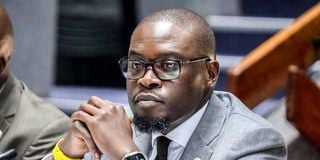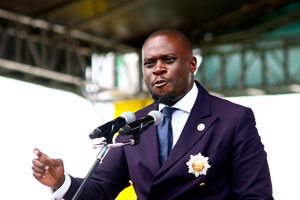
Nairobi Governor Johnson Sakaja.
To his growing list of critics, including top politicians from his own United Democratic Alliance (UDA) party, Nairobi Governor Johnson Sakaja has failed to live up to the expectations of the millions of city residents, whom he promised dignity when he rode to power in August 2022.
From a “Super Senator” of the capital city to a first-term governor under sustained attacks, Mr Sakaja has become a poster boy of everything bad with devolution in the eye of critics.
But the county boss and his allies believe his tenure at the helm of the capital city for the last one and a half years has been maliciously politicised by well-connected individuals who have in the past benefited from questionable deals as well as a political class, especially from UDA, uncomfortable with his close ties with veteran opposition leader Raila Odinga.
In his manifesto, Mr Sakaja pledged to make the capital city work. He also promised order, dignity and opportunity.
Nairobi is one of the counties worst affected by the ongoing heavy rains due to poor drainage and broken sewer lines. Businesspeople have complained of chaos as hawkers sell their wares in front of their shops for lack of designated markets.
But the governor says the hawkers also deserve to feed their families as his administration put up 20 markets he promised.
In an interview with the Sunday Nation, Governor Sakaja said fixing the mess in Nairobi requires time and proper planning.
He said his administration has fulfilled some of the promises it made to the people, including a feeding programme in public primary schools dubbed “Dishi Na County”.
Mr Sakaja said his pledge for 20 new markets to address the chaos caused by hawkers is on course, with ground-breakings having happened in some while others are having public participation following the acquisition of land.
Governor Sakaja opened up in the interview, saying the growing attack on his leadership especially by some ruling party politicians is because of his close relation with Mr Odinga.
Mr Sakaja appointed individuals associated with the opposition leader in his administration. He has also struck a good working relationship with Azimio La Umoja One Kenya Coalition Members of County Assembly (MCAs), who are the majority in the assembly.
Deputy President Rigathi Gachagua is among UDA politicians said to be against Mr Sakaja’s style of leadership.
Mr Gachagua has not publicly attacked the county boss, but UDA MPs among them Dagoretti South’s John Kiarie, James Gakuya (Embakasi North), Augustine Kamande (Roysambu) and Benjamin Gathiru (Embakasi Central) recently called out the governor for running down the city.
“There are some people who are not comfortable with us having to balance politics. There are some people who believe in the politics of exclusion. What they talk about is that you can only give things to these people, we can only support this part of the country,” Governor Sakaja said.
“I don’t believe in that kind of politics. I believe politics must be inclusive. My projects are in areas even where I didn’t get votes. So part of the problem is that I am working with people who did not vote for UDA.”
Opposition lawmakers
The county boss explained that he has no option but to work with President William Ruto and Mr Odinga for the county to realise development since the opposition MCAs form the majority.
He said his Bills are tabled in the House by an ODM Ward Representative who happens to be the majority leader.
Most departmental committees are also chaired by the opposition lawmakers.
“Some of these people (UDA politicians) would praise you for being the best governor today, like when I went to the groundbreaking for the Sh244 million Mutuini Market in Dagoretti. And in a short span, they change and say there is nothing going on, it is not working. So you realise there is another force behind it, it is not just the issues they are talking about but politics of interests.”
He maintained that having a city of order and dignity remains his priority, adding that some of the challenges facing Nairobi are historic.
“My priority for Nairobi is a working city, a city of order, dignity, hope and opportunity. There are many things that we need to deal with because Nairobi has not had a proper plan since 1976. Nairobi Metropolitan Services (NMS) attempted to procure urban planners to do area specific plans but it failed,” he said.
“What I have been able to do is to get resources for land use planning and development control. When the President goes to the United States, I accompany him to make sure that process can move. We are putting together this vision 2050 task force because we will have a population of 10.5 million in the city by then.”
Running down Nairobi
On Friday last week, Mr Kiarie led a section of Nairobi County leaders in castigating the Governor Sakaja, accusing him of running down the city.
“It is our observation that Nairobi could be facing its worst leadership crisis at City Hall in history. The dream that was sold during the campaigns of a city of order, dignity, hope and opportunity has turned into a nightmare. Nairobi is becoming clamped in an ever-tightening chokehold of an arrogant and dangerously corrupt leadership,” Mr Kiarie said.
“Nairobi deserves a leadership with a clear vision, a leadership that relies on a well-thought through masterplan as the cardinal guiding instrument that will be informing all policy decisions, legislative proposals, programmes and project decisions.”
But Mr Sakaja said he has a solid plan for his five-year term, stating that he is committed to delivering what he promised before his term elapses.
“I remember being asked what will you do in 100 days; I said my term is five years. We have signed the first ever wasteful energy project for Dandora. This is something that people have spoken over for decades. No one has come close to doing it. Forty-five megawatts of power will be coming out from that waste.”
He spoke about his flagship “Dishi na County”, saying his administration is feeding 184,000 public school learners.
Mr Sakaja added that his administration has built 10 kitchens, with ground breaking already done for seven others. The project, he said, has led to an increase in the number of children in schools.
But Nairobi Senator Edwin Sifuna has constantly questioned the programme, accusing the governor of excluding learners from private schools, who are the majority in the city.
Mr Sakaja said his administration promised to put up an Intensive Care Unit (ICU) at Mbagathi Hospital, adding that he has delivered two. The Neonatal ICU was launched by the governor in December.
On the persistent water shortages, he blamed the problem on “no forward planning”.
Mr Sakaja said the city receives 525.6 million litres of water against a requirement of 870 million. This means a deficit of more than 300 million litres of water.
“I have unlocked the stalled Northern Collector project. It stalled because some compensation was not made. Northern Collector 1 is going to add 140 million litres of water,” Governor Sakaja added.
“I have sought money, and I am happy because we are at an advanced stage with the Korean government, to give us some money to do Northern Collector 2 and Maragwa 4. Northern Collector 2 and Maragwa 4 are going to add 220 million litres of water in Nairobi,” he added.
On the broken sewer system, the governor said his administration has secured financing from the African Development Bank (ADB) and the French Development Agency to expand the sewer network in Kileleshwa and Lavington, respectively. Similar financing from Italy to support Kasarani-Mwiki sewer has also been secured by the county, he said.
No longer make money
Mr Sakaja said claims that he is corrupt stem from individuals who benefited from the previous administrations, but can no longer make money because of some of the measures he has put in place, among them a single business permit, have led to improved revenue collection.
Last week, Mr Sakaja and lawyer Donald Kipkorir engaged in an exchange over bribery demands in the county government.
Mr Kipkorir had accused the governor and his associates of asking for kickbacks before he could be paid his legal fees.
“It is easy to make wild allegations. This is a gentleman I have refused to meet. When I took office, I found Sh21 billion in pending legal fees. The amount is more than twice our own source of revenue. If you were to pay such an amount to lawyers, you will not even pay salaries,” Governor Mr Sakaja.
“I am changing that framework, because it is unsustainable for one person to claim more than Sh1 billion in legal fees. I wrote to the Salaries and Remuneration Commission to allow us to hire in-house lawyers. I showed them the bills as a justification.”
He added that an individual took the county government to court on the renovations of Uhuru Park, that time by the NMS.
“The lawyer who represented the county government is charging us Sh1.5 billion, the value of Uhuru Park, as if Uhuru Park was being sold,” he said.
He also spoke about the borough’s system he promised during the campaign period.
Then-Senator Sakaja said he would divide the county into six boroughs – Central, Southern, South Eastern, Eastern, Western and Northern – if elected governor.
“We have had public participation. Citizens want the boroughs. We have advertised for the borough managers. So these things are being done,” he said.
A borough is a small administrative unit whose main purpose is to decentralise government services.












